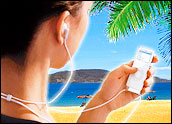
Today’s youth are at risk of going deaf relatively early in life because they are listening to MP3 players that are too loud, too often, according to a new report.
A survey of 1,000 Britons between the ages of 16 and 34, conducted by Specsavers Hearcare and Deafness Research UK, found that 14 percent of those individuals spend up to 28 hours per week listening to personal music players. The same survey found that roughly one-third of those who have experienced ringing in their ears — a sign of hearing damage — after listening to loud music, listen to their MP3 players every day.
Hearing loss affects one in seven people in the UK and is that nation’s second most common disability. Less than half of those surveyed by Specsavers have ever had a hearing test; many of those tests may have taken place years ago when those surveyed were in grade school.
I Like It Loud
“Many young people are regularly using MP3 players for long periods of time and are frighteningly unaware of the fact that loud noise can permanently damage your hearing,” said Vivienne Michael, chief executive of Deafness Research UK. “Hearing loss can make life unbearable. It cuts people off from their family and friends and makes everyday communication extremely difficult. We want people to realize that their hearing is as important as their sight and protect their ears against any potential damage.”
A similar study focusing on the United States and released in March found that more than half of U.S. high school students surveyed reported at least one symptom of hearing loss.
The poll, commissioned by the American Speech-Language-Hearing Association and conducted by Zogby International, looked at the usage habits of high school students and adults with respect to some popular technology that provides audio through earbuds or earphones, including Apple’s iPod, other MP3 players and portable DVD players. It also probed the public’s views about potential hearing loss from such devices and what they believe would be the most effective way to convey a hearing-loss prevention message.
“Nobody thinks you’re going to lose an ear, but those things happen. Folks are using all their reserve at an early age and there’s going to be no reserve to fall back on when natural hearing loss with aging takes place,” Brenda Lonsbury-Martin, chief staff officer of science and research for the American Speech-Language-Hearing Association, told TechNewsWorld. “Just like you have to wear a seatbelt, you have to protect your hearing, too.”
Teens have made complaints about poor hearing — interpreting others’ speech as mumbling, having to turn up TV sets and hearing ringing in their ears, Lonsbury-Martin noted. Her organization advises consumers to lower volume levels, limit listening time, and use earphones that block out unwanted sound that can prompt users to increase volume levels.
Burden to Bear
However, the responsibility must also go to the MP3 player makers themselves. Typically these types of companies promote best-use or common-sense use of their products, Jonathan Hoopes, managing director at Equity Research, told TechNewsWorld. However, more must be done, he opined.
Apple, for one, has designed earphones and software to monitor the noise level on its devices, addressing strict regulations from European Union countries. France, in particular, would not allow the company to sell its products unless they came with certain limitations on sound volume, Lonsbury-Martin said. She hopes that more companies will take similar humane approaches, regardless of whether laws mandate them to do so.
From a legal perspective, music device manufacturers have it easy compared to the automobile, gun or tobacco companies under the Surgeon General’s watchful eye, Hoopes said. The same goes for the potential risk to their bottom line.
“Does this ultimately end in a service label on the back of the device and does this affect sales? No,” Hoopes said. “Which is the [industry] with the most dark label? It’s cigarettes. If you have to put a label on the device, it shows it’s an addictive new type of lifestyle. If you ever get to that point, you have a winner.”





















































